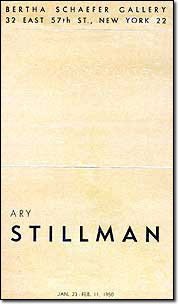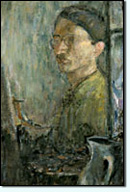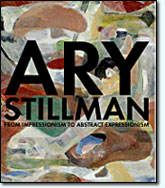Ary Stillman at Bertha Schaefer Gallery
January 23-February 11, 1951

Excerpted from Reminiscences, by Frances Stillman, 1988
"...It was in the fall of 1947 or perhaps the spring of 1948 that Bertha Schaefer opened her gallery on 57th Street. She had been widely known for years as an interior decorator, but for some time she had been eager to widen the scope of her work and to gather around her a group of representative painters. She wanted to advance the idea that one shouldn't choose a painting to fit in with the decor of a room, that one should choose a painting or paintings he or she would want to live with, and then build the tone of the room around the painting or paintings. She talked with Ary about this a number of times — they had been friends for years — and when she was prepared to exhibit her first group show she asked Ary to send in a painting. Milton Avery was in that show I recall, and Will Barnet, Ben Zion, Sue Fuller, Ary and others I can't remember. From this came a continued association for Ary with Bertha's gallery — many group shows, and a series of five one-man shows, beginning in February 1949 through 1954, until we left New York for Paris..."
Press Clippings
"Ary Stillman, exhibiting his newest pictures in a one-man show at the Bertha Schaefer Gallery, is a solid painter in the realistic-impressionist manner, who a few years ago, began to go abstract. For a while colors muddy, forms obscure. His latest efforts indicate that at last he has found himself in the new vein. Designed,for the most part, on musical themes (some of his titles are "Obligato", "Overture", and "Jazz"), the handsome new canvases are rhythmical in pattern, so composed that the well-defined shapes hold together in almost magnetic fashion."
E.G.
New York Herald Tribune
January 26, 1950
"The spirited paintings and drawings by Ary Stillman, at the Bertha Schaefer Gallery, belong in the border region between semi and complete abstraction. With their dots and dashes and flat patches of form and paint texture, the principal impression they make is one of nervous expressiveness. Some titles, such as 'Jazz,' indicate that certain ones have been inspired by hearing music. Others, like 'Legend,' carry suggestive poetic ideas. This literary content, vague though it may be, is all to the good. For, as abstractions, they leave something to be desired. Their color harmonies, warm and rusty as those of a Persian carpet, would be no more than decorative without the inferences of subject matter to which the artist attaches them. In the drawings all his delicacy as a technician is manifested."
Stuart Preston
The New York Times
January 29, 1950
"Ary Stillman, in his second one man show, giving free rein to linear impulse, communicates glimpses of a personal inner world which at best is warm and lyrical. Although his painterly abstractions may at first glance recall the early Kandinsky, Stillman's direction is actually less expressionist and more poetic, and he seems considerably indebted to Oriental art with its linear interplay and elegant decoration. This filtering of feeling through the meshes of another art is probably, at the same time, the source of much of the charm as well as some of the limitation of these ingratiating paintings. Stillman seems to let his brush wander almost automatically in search of a motif which is never more than suggested. Faces, figures and fragments of exotic landscapes appear in glowing color planes or are caught in a web of line without ever resolving into material forms. Prices unquoted."
D.S.
Art News
January 1950
"Ary Stillman’s current exhibition asserts again how well an abstract style can serve lyrical statement and enrich the evocative image. In the 13th New York exhibition by this poetic painter, he sustains his personal mood and quality of individuality throughout.
Musical themes inspire three paintings and without descending to trite analogies, they successfully translate the intangibles of one art form into another. "Overture," for example, captures the rising sense of promising beginnings that such a musical composition can offer.
Other pictures that also use warm, romantic color and rhythmic design to highly satisfying results include "Decoys", in which subject-objects are still clearly discernible but woven into gay fantasy, and "Spectrum II," which sings a kind of spring song. In addition to the paintings, the exhibition also includes seven drawings, all more abstract than the paintings but amply designed and communicative."
Judith Kaye Reed
The Art Digest
February 1, 1950
"Ary Stillman’s abstractions are on view at the Bertha Schaefer Galleries through February 11th. Titles would seem to be of secondary consideration in this demonstration of the artist’s investigation into form and color. May it suffice that, colorwise, the artist has never lost control of his aesthetic reins and that the resultant muted color is successfully utilized in his experiments with depth, line, action and movement. The balance of power achieved between color and form is strikingly manifest."
Pictures on Exhibit
February, 1950
Some Exhibited Artwork Titles:
Fireworks, Overture, Decoys, Legend, Gold and Blue, Brown Shadows, Obligato, Structural, Jazz, Spectrum II, Twilight and 7 drawings.





